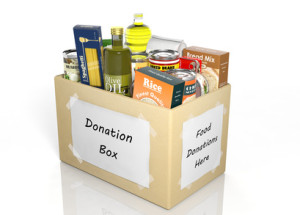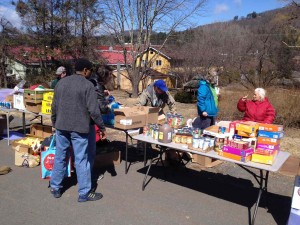March 7, 2018 at 12:48 am
 The homeless have problems just like you and me: employment, health issues, disabilities, domestic violence. They just don’t have a roof over their heads.
The homeless have problems just like you and me: employment, health issues, disabilities, domestic violence. They just don’t have a roof over their heads.
Homeless people, families enter food pantries very quietly. They’ve lost their voices. The goal is to melt into the background, get food, and disappear.
There’s an exception to the voicelessness – when the person communicates with beings unknown to the rest of us. One shopper I know has been in another world since before I began working in the pantry in 2005. He communicates in a high, shrill, unknown tongue which I cannot describe. His shrill vowels are punctuated with hard, sharp whistles, clicks, squeaks.
We can all help homeless people in some way. Each of us has talents and skills which can be useful.
DONATE. Homeless people carry their kitchens in their pockets . So much food which we take for granted is just not helpful. Important in the homeless diet is peanut butter and crackers in individually wrapped packages, cereal in self-serve packaging. Fruits and vegetables which can be eaten raw, milk and/or fruit juice in individual containers. Donate these items throughout the year by regularly giving the food to a food pantry in your area which is homlesss friendly.
VOLUNTEER. Pantries everywhere need an extra set of hands to answer mail, drive a truck, serve food, clean up at closing time, send press releases, hold food drives, stock and straighten shelves, deliver food to the home bound.
CLEAN OUT YOUR CLOSETS. Donate clothing, bedding, books, and other gently used items to places where the homeless will have access to them.
SHARE. Do you or someone you know have a garden? Donate the excess to a homeless friendly pantry in your area. When your garden tomatoes get to be too plentiful, there are those in your area who need the food.
PUSH THE ENVELOPE. Contact elected officials about homeless issues in your area. Encourage them to make ending homelessness important in your community.
EDUCATE YOURSELF. Returning veterans have special needs. For one thing, they begin separation from the military homeless.
FIND A JOB. Encourage your church or community to hire a homeless person. Many homeless want to work, have skills, but have trouble finding regular employment.
DO YOU HAVE A SKILL TO SHARE? Contact a local shelter and offer to give classes.
For a time, one of our most trusted volunteer/shoppers was homeless. His partner, Nancy, died and her children didn’t want him in the house they had lived in together for many years. He fought her children for a year with a lawyer, made several trips to court, the whole enchilada.
He finally moved out and ended up homeless for a time. He eventually got housing through a homeless veterans program. I helped him move his clothes and things over to his new apartment in Saugerties.
Homelessness cannot be generalized. Each homeless person is a special personality and has a special situation which s/he deals with. So here’s my rule about homeless people:
IF YOU’VE SEEN ONE HOMELESS PERSON, YOU’VE SEEN ONE HOMELESS PERSON.
Thank you for reading this blog post. Please share it with your preferred social media network.
BOOK UPDATE: The new hunger book is going to be out soon. The publisher assures me that we’re going to see the book within a month! Hurrah!
 Thanks again
Thanks again
Thurman
November 10, 2015 at 7:48 am

“Homeless is not a category of people. It’s just a situation that happens. It can happen to anyone.” – Salvador Altamirano-Segura
The homeless have problems just like you and me:
employment
health issues
disabilities
domestic violence
veterans
THEY JUST DON’T HAVE A ROOF OVER THEIR HEADS.
Homeless people, families enter food pantries very quietly. They’ve lost their voices. The goal is to melt into the background, get food, and disappear.
There is an exception to the voicelessness when the person communicates with beings unknown to the rest of us in tongues we don’t understand. One shopper I know has been in another world since before I began working in the pantry in 2005.
We can all help the homeless in some way. Each of us has talents and skills which can be useful.
1. DONATE. Homeless people carry their kitchens in their pockets so a lot of food which we take for granted and use is just not helpful. Important in the homeless diet is:
peanut butter and crackers
cereal in small packages
fruits and vegetables which can be eaten raw
milk in small containers.
Give throughout the year by regularly donating to a food pantry in your area which is most homeless friendly.
2. VOLUNTEER. Pantries everywhere need an extra set of hands to:
Answer mail
Drive a truck
Serve food
Clean up at closing time
Send press releases
Hold food drives
Straighten shelves
Deliver food to the home bound
3. CLEAN OUT YOUR CLOSETS. Donate clothing, bedding, books, in good condition to places where the homeless will have access to your gently used items.
4. SHARE. Do you or does someone you know have a garden? Donate the excess to a homeless friendly pantry or soup kitchen in your area. When your garden tomatoes get to be too plentiful, there are those in your area who need the food. Donate, don’t dump.
5. PUSH THE ENVELOPE. Contact elected officials about homeless issues in your area. Encourage them to make ending homelessness important in your community.
6. EDUCATE YOURSELF. Returning veterans have special needs. For one thing, they often begin their separation from the military homeless.
7. FIND A JOB. Encourage your church or community to hire a homeless person. Many homeless want to work, have skills, but have trouble finding regular employment.
8. TEACH. Do you have a skill to share? Contact a local shelter and offer to give classes.
Thank you for reading this blog/book.
The stories are true. The people are real.
Please share this article with your preferred social media network. And send it to anyone you know who might be interested.
Don’t forget to join the email list.
Artwork for this article was donated by Jennette Nearhood
Thurman Greco
May 26, 2015 at 6:20 am

WORK FIRST – Since the ’90s, many states have been hell bent to Harry to get people to work…no matter what. Welfare is no longer on the table.
A tip here: Many people don’t realize that the Good Ol’ U S of A hasn’t offered much in the way of welfare in a long, long time.
In polite conversation, I hear the statement: “What they need is a swift kick in the rear to get on somebody’s payroll.” I find it totally amazing that people in this country have been and continue to be comfortable denying assistance to destitute families while offering tax breaks to the wealthy on vacation homes, yachts, etc.
The question I have is this: How do people cope?
Work first is not always a good option. I regularly see pantry shoppers with family members who would be institutionalized if they weren’t being cared for by the family. The problem is that the family has nothing. So while Helen or Sue or Fred is caring for the ill person, s/he is not able to work.
Right now, in our pantry there is an older couple…he’s obviously a loving caregiver. This man might be able to work were it not for his very ill wife.
Another woman shops regularly with a very mentally ill family member. This young man cannot be left alone…not even for a few minutes.
While the sick/handicapped family member is being cared for at home, the state is paying little or nothing. So, the family is in desperate financial straits because of a very ill family member. One day, someone in this family is going to realize the situation and then our state’s bill is going to increase significantly when the ill person is institutionalized.
I’m suspecting at least some of these people are very willing to care for the ill/handicapped family member because there are no jobs out here. When a job comes along, the person will be working and the state will be paying a very hefty bill for the institution.
Wouldn’t it just be better in the long run to pay the family a stipend in lieu of the institution?
But, family members are not unemployed solely because of a sick/handicapped family member. There are several reasons why people simply cannot work…no matter how many swift kicks the extremely poor person receives. These barriers to work success can effectively kill someone’s career:
Work first is an interesting philosophy when there are no jobs.
Poor quality childcare will kill a job faster than anything. When a family exists below the poverty level, there is no $$$ for childcare. So, the children go to grandma’s, or the neighbor down the road…or stay home alone.
Transportation issues are major factors in unemployment. They include:
no public transportation,
not owning a vehicle which is 4-season functional,
not having enough gas $$$, and finally,
not having the $$$ to fix the car when it breaks down.
A lot of networking is done in pantry lines for a mechanic to keep the family wreck on the road.
Literacy issues and lack of work experience are barriers to employment. In our area, there are some illiterate people.
Until a person has a job, it’s difficult to get a job. So…it can be very challenging to find the first job. I know young people working for free in hopes of finding something that will pay. Then, one day, they get something part time, off the books! The next step up the ladder is to graduate to half on/half off. Then, finally, hurray! A job finally happens which is on the books. A job with benefits is often beyond the dream of a person in our area.
Then, of course, we have the taboo subject: domestic violence. At the poverty level, domestic violence is simply not discussed. Domestic abuse contributes to poverty. A woman cannot escape an abusive situation without $$$ and right now there’s not much of that around.
There is not much attention given to this situation. In future blog posts, I will be
addressing this tragic situation because it is prevalent in our society.
Thank you for reading this blog/book
Please refer this article to your preferred social media network.
Please send a comment.
Don’t forget to join the email list.
Peace and food for all.
Thurman Greco
 The homeless have problems just like you and me: employment, health issues, disabilities, domestic violence. They just don’t have a roof over their heads.
The homeless have problems just like you and me: employment, health issues, disabilities, domestic violence. They just don’t have a roof over their heads. Thanks again
Thanks again







